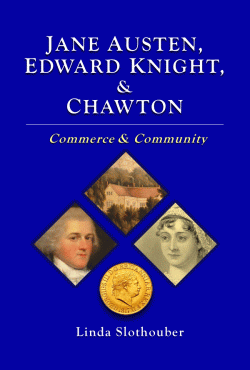 Gentle Readers: Today I welcome Linda Slothouber, author of Jane Austen, Edward Knight, & Chawton: Commerce & Community (Woodpigeon Publishing, 2015), the result of her research at Chawton House Library in 2013. As the recipient of a grant through JASNA’s International Visitor Program, Linda’s project was to research the management of the Chawton estate in Hampshire during Edward Knight’s [nee Austen] ownership and this recently published book presents her findings. It is a most interesting and informative read, giving insights into the life and character of Jane Austen’s brother, thereby showing us how knowledgeable Jane Austen was in creating her own Heroes as landlords [think Mr. Knightley and Mr. Darcy! Henry Crawford, not so much…] – she had a fine model in her very own brother! I cannot improve upon what Deirdre Le Faye has written, that this book is “an essential addition to the Austenian bookshelf.”
Gentle Readers: Today I welcome Linda Slothouber, author of Jane Austen, Edward Knight, & Chawton: Commerce & Community (Woodpigeon Publishing, 2015), the result of her research at Chawton House Library in 2013. As the recipient of a grant through JASNA’s International Visitor Program, Linda’s project was to research the management of the Chawton estate in Hampshire during Edward Knight’s [nee Austen] ownership and this recently published book presents her findings. It is a most interesting and informative read, giving insights into the life and character of Jane Austen’s brother, thereby showing us how knowledgeable Jane Austen was in creating her own Heroes as landlords [think Mr. Knightley and Mr. Darcy! Henry Crawford, not so much…] – she had a fine model in her very own brother! I cannot improve upon what Deirdre Le Faye has written, that this book is “an essential addition to the Austenian bookshelf.”
I asked Linda how she chose this topic, what prompted her to apply for the JASNA grant, and here is her response: “Having written about other businesses in Jane Austen’s time, such as Wedgwood and Richard Arkwright’s cotton-spinning empire, I was very interested in how the business of estate management worked, both in the real world and in Jane Austen’s fiction. I made some preliminary inquiries and found out from Chawton House Library about the Knight Archive and other potential resources. My original intention, when I applied to JASNA’s International Visitor Program, was to write a much shorter book, but each question I answered spawned two more, and I discovered some stories and information I just couldn’t bear to leave out.” She tells us more about it all in her post below.
Linda has generously offered us a copy of her book for a giveaway, so please leave any comments and questions for her after this post in order to be entered into the random drawing [details below].
**************
Edward Knight, Landlord
by Linda Slothouber
The number of books, websites, magazines, and television programs that aim to explain the world in which Jane Austen lived must number well into the hundreds. Many of them give a broad view of historical events and cultural conditions, compressing decades of time and significant regional diversities into a notional Georgian/Regency England.
In researching my book, Jane Austen, Edward Knight, & Chawton: Commerce and Community, I wanted to complement the more general histories by looking closely at specific people in a specific place. My goal was to answer my own questions about the structure and economy of the English estate by looking at the experience of the estate-owner who would have been most familiar to Jane Austen: her brother, Edward. Adopted by rich relations, Edward inherited Godmersham Park in Kent; property in Chawton, Steventon, and elsewhere in Hampshire; and property in three other counties, changing his surname to Knight as a condition of the inheritance. (Ronald Dunning gives more background on the Knight family here.)
I knew that the landed gentry made their money from renting and using their inherited lands, but how exactly did that happen? How involved were landowners in estate management? Jane Austen’s brother was an excellent case study. I also wanted to explore how Chawton actually functioned as a community and get a better look at the people who lived in the cottages and farmhouses. Who were the people that Jane Austen would have encountered during her years in Chawton? When Chawton Great House was vacant or in the hands of tenants, what effect did that have on the estate and the village?
My research into these questions was possible because of the availability of the Knight Archive, a treasure trove of several centuries’ worth of papers. In 1961, 1986, and at various points in the 1990s, the Knight family gathered up record books, official documents, and random bits of paper from Chawton House and turned them over to the Hampshire Record Office in Winchester. The HRO’s archivists created an index, but, because many entries refer to bundles of documents, the index can’t comprehensively describe everything in the archive. The experience of going through one bundle after another, carefully unfolding 200-year-old papers to discover what each one contained, is something I will never forget! Among the fascinating odds and ends I came across were the bills for Elizabeth Austen’s funeral and for the care of Jane and Edward’s brother George in his last weeks, the seating plan for the church in Chawton, and the list of poor old ladies to whom flannel petticoats were given after Edward Knight’s death.
Most of the documents in the Knight Archive concern the management of the Chawton estate and other Knight holdings. While there are significant gaps, what has survived provides important insight into the Knights’ estate operations in Hampshire over a long period of time. I read estate papers written by Elizabeth Knight and her steward in the early 1700s, and then turned to an estate wages book from the early 1900s, when Montagu Knight was the squire; some of the activities done on the estate remained remarkably constant, and some of the same surnames appeared on the lists of workers in both centuries. As the focus of my research fell exactly between these two points, the range of documents provided an invaluable context for understanding Edward Knight’s period of ownership.
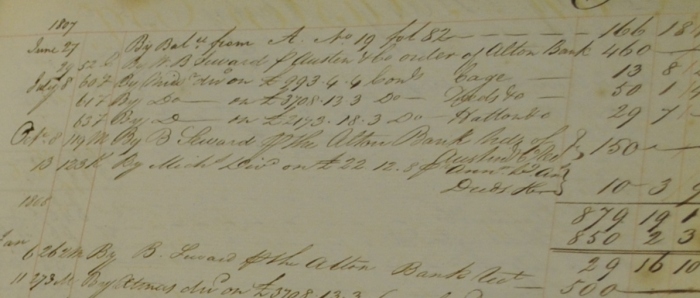
Excerpt from Edward Knight’s 1807 bank ledger, showing several deposits of estate income made by his steward, Bridger Seward, and forwarded through Henry Austen’s bank in Alton. (Courtesy of Barclays Group Archives)
The period between 1808 and 1819, encompassing the years when Jane Austen lived in Chawton, is, by chance, particularly well documented. An estate accounts book has survived and is supported by bundles of vouchers documenting specific purchases and jobs done on the estate. To pursue some questions, such as how much money Edward Knight earned from all his property in a typical year, I had to do some detective work, comparing the data found in the Knight Archive with that from other sources, including the Godmersham Heritage Centre, Barclays Group Archives (which holds Knight’s banking ledgers), and previously published sources such as Deirdre Le Faye’s Chronology of Jane Austen and Her Family.
So what did I learn? It turns out Edward Knight had more land, and less money, than has commonly been believed. I estimate that his contemporaries would have spoken of him as having “7,000 or 8,000 pounds a year,” not the £15,000 his near-contemporary Mary Russell Mitford stated (admittedly based on hearsay) as his income. Knight had to contend with a lawsuit that threatened his ownership of his Hampshire property – that much is well-known – but his wealth was also affected by changes in the national economy that affected land values and farming income, presenting problems that plagued him throughout the 1820s and seem to have had an effect on his health, as well.
Knight felt deeply his responsibilities to his family, to the community, and to his own posterity – his son and the future heirs of the Knight estates. Throughout his life, he provided financial assistance to many members of his family, though his female relations received far less direct financial support than his brothers did, or received assistance in ways that were not recorded in bank ledgers. As for the community, Knight’s support for education, health care, and housing for the poor made Chawton more stable and less miserable than many other villages at the time. It may be tempting to criticize some of his actions and omissions from our 21st-century vantage point, but L.P. Hartley’s maxim holds true: “The past is another country: they do things differently there.”
Learning about Edward Knight’s history and experience in estate management is valuable in its own right, but adding to the body of knowledge about Jane Austen is always a goal. By discovering more about the people she knew during her eight years in Chawton and comparing the facts of their lives with what she wrote about them, we may come a tiny step closer to understanding her views and feelings.
One individual she knew well is William Triggs, Edward Knight’s gamekeeper at Chawton. Triggs was by far the most well-paid of the Chawton estate servants; his salary of £52 was nearly half that of the estate steward. His primary responsibility was to protect game on the estate for Edward Knight’s sons and guests to shoot when they came to stay. Since this didn’t happen often, some of his time was spent overseeing hay-making and other projects on the land, paying workers, and selling hay and potatoes on behalf of the estate (all tasks a bailiff might have done, but Knight didn’t employ one at Chawton at the time). He was trusted with the money required to carry out these tasks and he earned a commission on sales. He had guns and dogs and a horse that was purchased with estate funds, as was his hat, which cost a guinea (four times the cost of a common laborer’s hat). Gamekeepers at the time were often resented by villagers for their high-handed ways and for siding with landowners, and this may have been the case with Triggs. I found only one record in Knight’s estate accounts of poachers being conveyed to jail, but I did find a mention of a charge of assault brought against Triggs, which was settled by the estate paying the large sum of 9 pounds to the victim.
Jane Austen mentioned Triggs several times in her letters. She found in him a worthy subject of long-running jokes shared with several members of her family. She ended one letter, written from Godmersham Park to Cassandra back in Chawton, “With love to you all, including Triggs.” In another letter, she wrote of seeing Triggs scurry down the lane, laden with birdcages and luggage, to meet the coach—not the kindest observation surely, but it seems to me she took some delight in seeing Triggs lose his swagger and struggle with lowly tasks. In 1817, an interesting meeting took place: “Tell William [Edward Knight’s son] that Triggs is as beautiful & condescending as ever, & was so good as to dine with us today,” wrote Jane. We must imagine Triggs, the servant who perhaps acted above his station, sitting down to dine with the Austen women, who were related to the squire at the Great House but living in much humbler circumstances. How did Jane Austen feel about being condescended to by her brother’s employee? She tried to make conversation with him, but was it the sort of conversation Mr. Bennet had with Mr. Collins at dinner? Did she speak aloud, teasingly, what she later wrote in her letter, that Triggs must have looked “very handsome” in his green coat at a recent funeral procession? By discovering more about the dinner guest at the cottage table, it becomes easier to at least formulate such questions, even if the answers remain elusive.
A final word: Even a scrap of paper of no obvious significance, which might easily have gone in the fire 200 years 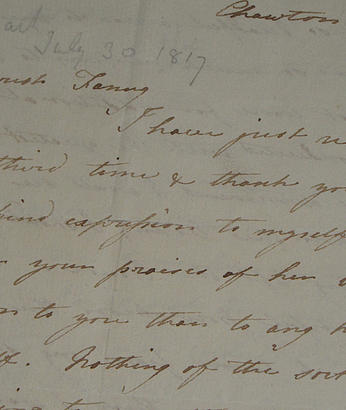 ago, has its magic today: the words, the spelling, the quality of signatures (or X’s marked down by the unlettered), and the amount of paper allocated to a particular purpose all tell us something. If such ephemera is worth saving and studying, then how much more essential is it to preserve a unique document that is central to Jane Austen’s life story? Right now, Jane Austen’s House Museum is engaged in a campaign to collect £10,000 to purchase the letter that Cassandra Austen wrote to her niece Fanny immediately after Jane Austen’s death. To secure the letter, this sum must be collected within less than three months. Please read about the letter and consider contributing to the fundraising campaign. [ The letter is CEA / 3, dated July 29, 1817 – Le Faye, 4th ed., p. 363 – you can read the text here]
ago, has its magic today: the words, the spelling, the quality of signatures (or X’s marked down by the unlettered), and the amount of paper allocated to a particular purpose all tell us something. If such ephemera is worth saving and studying, then how much more essential is it to preserve a unique document that is central to Jane Austen’s life story? Right now, Jane Austen’s House Museum is engaged in a campaign to collect £10,000 to purchase the letter that Cassandra Austen wrote to her niece Fanny immediately after Jane Austen’s death. To secure the letter, this sum must be collected within less than three months. Please read about the letter and consider contributing to the fundraising campaign. [ The letter is CEA / 3, dated July 29, 1817 – Le Faye, 4th ed., p. 363 – you can read the text here]
**************
About the Author: A 20-year career in management and technology consulting, degrees in English and Administration, and a stint as JASNA’s International Visitor to Chawton in 2013 created the foundation for Linda to write her 2015 book, Jane Austen, Edward Knight, & Chawton: Commerce & Community. The book is available from Amazon, Woodpigeon Publishing, and Jane Austen Books in the U.S., and is available in the shop at Chawton House Library. Linda blogs about new findings and supplemental research at chawtoncommerceandcommunity.blogspot.com. [Please note that Linda will be donating all profits from U.S. sales to the JASNA 2016 AGM. For those of you attending JASNA-Vermont’s 7 June 2015 meeting, I will have copies for sale.]
*************
Book Giveaway:
Thanks you so much Linda for your guest post on Edward Knight! Readers, please leave a comment or question for Linda in order to be entered into a random drawing to win a copy of Jane Austen, Edward Knight, & Chawton: Commerce and Community. Deadline is next Friday May 22, 2015 at 11:59 pm. Winner will be announced on May 23. Limited to domestic mailings, sorry to say, but don’t let that keep you from commenting!
[Tony Grant and I visited CHL last May on a very rainy day –
his picture was better than mine so I use it here with thanks!]

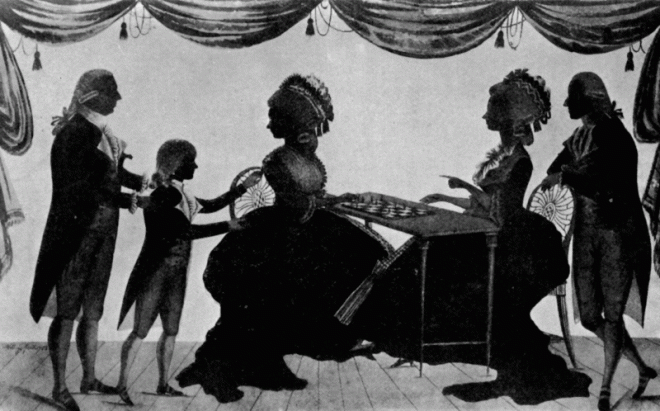

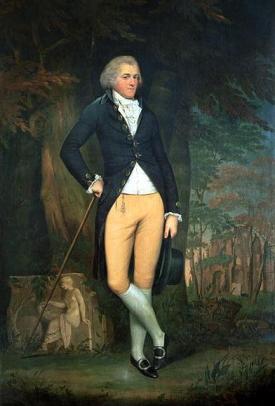
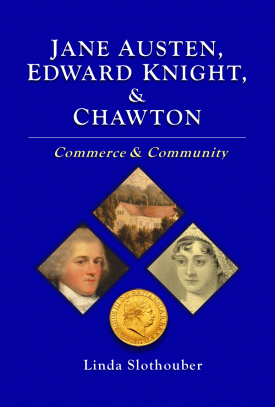
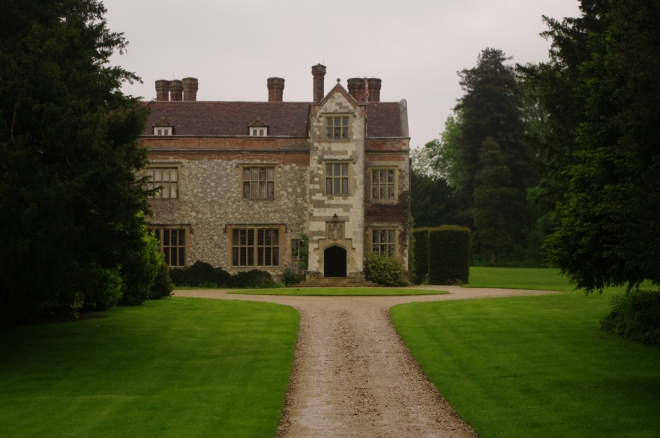
What a fascinating angle of research. Loved learning about the gamekeepr Triggs, too. I’m looking forward to the new book!
LikeLike
Quite fascinating. I am particularly interested in your comment that Edward had more land and less money than many thought then and today. I know there are those who revile Edward today for not doing more for his mother and sisters instead of praising him for what he did do. . I’d love to have a copy of that book as much for what it says about general conditions and Edward’s in particular.
I have the impression that Mr. Knightley also had more land than cash on hand and that his brother John received an allowance or something from their estate.
LikeLiked by 1 person
This book is just fascinating! It’s from all
these “mundane” details that one truly
learns about life in the England of Jane
Austen. Thank you for the giveaway,
LikeLike
This looks fascinating. How interesting it must have been to research and write this! I wish I’d had the chance to read it before, but better late than never. Definitely going to track this down. Thanks.
LikeLike
I am repetitively new to the world of Jane Austen and I find that there are a great many thing that I do not understand and therefore have many questions. I think that Ms. Slothouber’s new book is going to be a must have as it will be helpful is answering many questions that I have and many that I haven’t thought of yet.
LikeLike
Linda, what you’ve written here does whet the appetite! It’s great that you were able to spend an extended period in Hampshire to investigate the archives. I’ll be telephoning the Chawton House Library’s bookshop tomorrow to bag a copy.
LikeLike
I am captivated with this wonderful feature and unique book. What fabulous research and information.
LikeLike
Your appreciation for even a tiny slip of paper and what it evokes on different levels is wonderful. I am SO looking forward to studying your book. I say studying, because it sounds like an education rather than simple entertainment. I visited Chawton recently and soaked up all I could. Slow walking through the wooded paths, sitting in the graveyard, even a chat with a gamekeeper (!) who had just shot a rabbit. Looking forward to your book.
LikeLike
Thanks to all of you for your kind and thought-provoking comments. Fran, your recent visit to Chawton sounds wonderful — I miss it! Lori, I don’t think any of us will ever run out of questions about Austen and her world (and that’s a good thing). Nancy, yes, I’ve seen such judgments about Edward as well, based on little evidence and on modern notions of gender and family… I’ve tried to create a more nuanced and informed picture of him and his relations with his Austen family. Thanks again everyone for taking an interest!
LikeLike
Although I cannot take part in the giveaway, I cannot resist to comment. It is fascinating the findings about Edward’s fortune.
I also wonder if it the book will be available for those of us outside US from more convenient online bookstorres (the Amazon link is from “other sellers” which don’t offer international shipping) and I cannot find it at Book Depository, which offers free shipping to several countries.
LikeLike
Hello Cinthia,
The Amazon link does not offer international shipping due to the high postage cost, which is more than the price of the book itself (to the UK, anyway). Feel free to write to me at woodpigeonpublishing@gmail.com with your location and I’ll tell you how much postage to your country would be. If you are in the UK, Chawton House Library has copies; if you are attending the JASNA AGM in Louisville, I’ll be there with copies to sell and sign. Jane Austen Books also carries the book in their stock, but I don’t know what their shipping charges would be. I will check into the Book Depository too.
Thanks for asking about it!
LikeLike
Very interesting! Do any of the documents shed any light on the personalities of Edward and Elizabeth Knight?
LikeLike
Hi KIrk – Linda can answer this better than I, but I did find in reading the book my opinion of Edward changed dramatically – we have all for too long made certain assumptions about him based on not enough facts or not enough reading – Linda’s book makes it very clear, with facts in hand, that he was a caring and dedicated landowner, generous to his tenants and employees and did much more for his Mother and two sisters than we might have previously believed. There is little about Elizabeth, as the focus here is on Edward as a landlord in Chawton – but he does come across as a very caring father and committed to his heir to continue as an effective landowner. What one knows for sure is that Edward was definitely a Mr Knightley!
LikeLiked by 1 person
Thanks Deb! If I remember correctly, he was portrayed as “favorable” in “The Mysterious Death of Miss Jane Austen”. Did you listen the BBC Radio portrayal of Elizabeth Knight by Downton Abbey’s Laura Carmichael? Lol, not at all “favorable”.
LikeLike
Deborah makes an excellent point about facts. (Could any of us stand the test of our character being assessed based on a handful of random facts or recollections?) It would be great if someone could find more letters or primary sources to increase our knowledge of Elizabeth Austen’s life, but the archives I was looking in didn’t have that type of material. My own opinion about Edward is that he was diligent about everything he undertook — not given to the bold strokes or creative vision that might have led him to play a part in social reform or give his sister a “genius grant,” unfortunately — but he was caring, consistent, and effective in carrying out his duty as he perceived it.
LikeLike
I cant wait to read this book. Ever since I read Sophia Hillan’s excellent book on Jane Austen’s younger nieces I have been far more aware and interested in the Knight part of the Austen clan. Hillan also touches on the financial affairs of the Knights, especially the impact of the financial resolution of the lawsuit, and how it negatively affected the lives of the younger daughters in the family. Well done, Linda for researching and sharing this whole aspect of Austen’s life.
LikeLike
Hi all. I have just stumbled across this page via an online search. I am hoping some one will still respond to messages. I live in New Zealand and am interested to find out how I could buy a copy of this book, please. My Great x5 Grandfather, John Gibbs (b. Chawton 1774), was one of Edward Austen Knight’s tenants for a period of time! John’s grandson was my first ancestor to leave England to settle in New Zealand.
Thank you for your help.
LikeLike
Hello Angela, I will put you in touch with Linda the author of the book. How exciting to have an ancestor who lived at Chawton House!
LikeLike